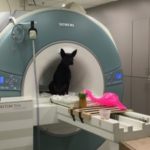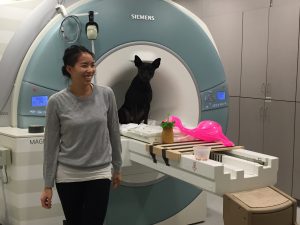Tiki Learning

November 23, 2016
Our upcoming canine fMRI study, nicknamed “Tiki Learning,” evaluates the canine cognitive process upon exposure to visual stimuli. In the Tiki Learning experiment, while in the scanner the dogs are randomly exposed to two objects that they have not previously observed. After one object the dog receives a treat, whereas nothing noteworthy occurs subsequent to observing the second object. To enhance visual discrimination, the two objects have salient differences in size, color, shape, and texture.
During the experiment, we time code hemodynamic measurements in key regions of interest within each dog’s brain. We then use Analysis for Functional Neuro Images (AFNI) software to statistically interpret the raw data. Summarily, we hope to acquire increased knowledge regarding canine erudition and the relationship between learning and emotion.
The Tiki Learning experiment has practical applications that we may use to improve CPT’s training methodology. We should acquire knowledge regarding the hi-lo range and the average number of repetitions required for dogs to understand the associative relevance between a visual stimulus and reward. In addition, we should acquire knowledge regarding the optimal number of repetitions to maximize motivation during incipient learning stages. In simple terms, we hope to answer the question regarding the ideal number of repetitions during a training session, as we wish to avoid the confusion possible from undertraining and the loss of motivation possible from overtraining.

In future experiments, we will similarly examine the learning process with alternative sensory inputs. We wish to compare whether dogs learn best with visual, auditory, olfactory, or haptic information, whether the answer depends on the dog, and the best training modalities when using a particular sensory format.
CPT’s goal is to remain not only at the forefront of training, but to be a leader in progressing science as a tool for advancing knowledge regarding canine learning theory and behavioral psychology.
(Sandy Springs, GA)
(Atlanta, GA)
(Decatur, GA)


